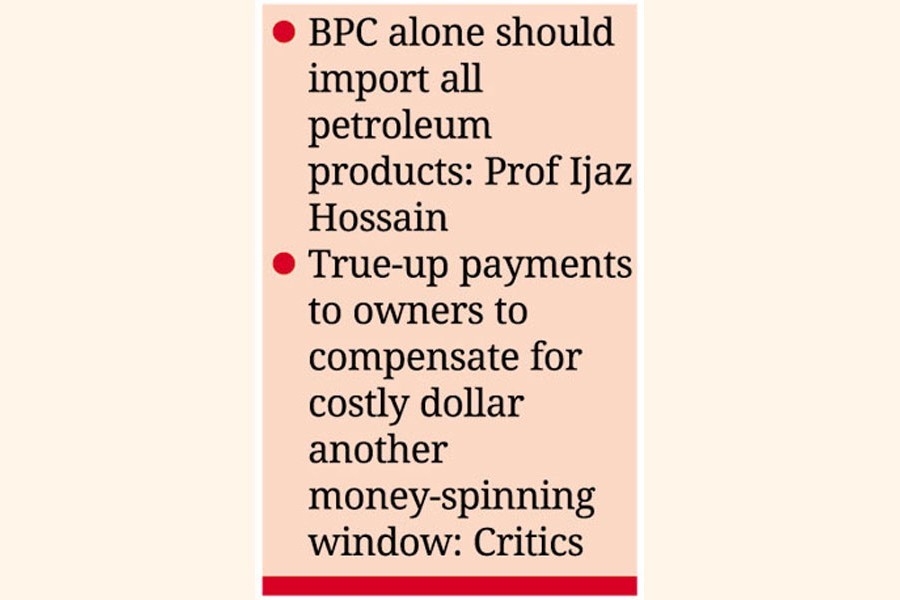Overdue government payments and LC problem stall the import of furnace oil by the owners of private-sector power plants, shifting the burden of fuelling their units to the public exchequer.
Sources say a number of private oil-fired power-plant owners have stopped importing furnace oil for complexities in opening letter of credit (LC) and delays in payment of dues by the government.
Some others have squeezed importing the fuel despite having provisions of incentives against furnace-oil imports, they add.
They are now shifting the job of importing furnace oil to the state-run Bangladesh Petroleum Corporation (BPC) to run their power plants.
"We will have to import around 900,000 tonnes of furnace oil in 2023--three times the quantity we are importing during 2022--due to the apathy from private sector to import the fuel," a senior BPC official told the FE Sunday.
He said the BPC has been importing around 300,000 tonnes of furnace oil during 2022.
Officials say the owners of some private power plants have either shut their plants or scaled down electricity generation on grounds that they are in fund crisis to import fuels.
This is the first time that the private-sector power producers -- who sell electricity to government under much-talked-about unsolicited deals - have stopped importing furnace oil or squeezed electricity generation on their free will while there has been a crying need for electricity.
Many private oil-fired power plants could not generate electricity from their plants as they lack necessary fuels to run their plants, the owner of a private power plant said.
Most of them are running with fund shortages as BPDB is not paying them regularly to continue electricity generation as per agreement, he alleged.
Currently, the BPDB owes around Tk 160 billion to the private power-plant owners, he says.
"We are importing fuel as much as we can to generate electricity," he adds.
Officials said most oil-fired plants were awarded to the private sector through unsolicited offers under the Speedy Supply of Power and Energy (Special Provision) Act 2010. The law has a provision of immunity to those involved with quick-fix remedies.
The private plant owners purchase furnace oil of their own on a 'free on board (FOB)' basis, and arrange vessels to import oil by paying freights of their own. Then they get back all the costs along with 9.0-percent service charge from the BPDB. The private owners also get payment additionally for generating electricity from their plants.
They have been importing furnace oil since 2010 as the Petroleum Corporation then expressed its 'inability' to import the fuel for private sector, a senior BPC official says.
But, over the past one decade, the BPC has improved its capacity to import furnace oil as per the requirement of private sector, he claims.
To come out of the situation there is no alternative but to ensure 'true-up payments' in favour of private power-plant owners who import furnace oil of their own, said the plant owner.
True-up payment is to reconcile or match the balance of two or more items. It will be a sort of compensation to the private power owners for fluctuations in exchange rates.
The BPDB will have to ink 'side-letter agreements' with the private owners in addition to the existing deals to ensure the payments.
Currently, private-sector owners are not getting sufficient US dollars from the central bank to import furnace oil, he said. Local and foreign banks are also showing reluctance to open LCs for importing furnace oil.
"We're incurring losses as we're paying around Tk 110 per US dollar in importing furnace oil but get payment from the BPDB as per bank rates, which is much below the import price," he adds.
Rights groups and energy experts, who have long been critical of private power-production deals, again oppose such true-up payments as they think it will be an additional window of making money by "fooling people".
"I think BPC alone should have the responsibility to import all sorts of petroleum products from the international market to ensure transparency and accountability in fuel-import costs," says energy-expert Prof Ijaz Hossain.
Mr Hossain, who teaches chemical engineering at Bangladesh University of Engineering and Technology (BUET), suggests that the government ensure proper monitoring to check irregularities.
There is a mismatch in importing petroleum products by the public sector and the private sector alike, Dr Shamsul Alam, energy adviser of the Consumers Association of Bangladesh (CAB), tells the FE.
The BPC has long been maintaining a low-accounting system, which is helping the vested groups to waste public money, he remarks.
"The private plant owners should shoulder the loss from dollar fluctuations, if any, from the amount of 9.0 per cent they get from the BPDB," Mr Alam adds.


